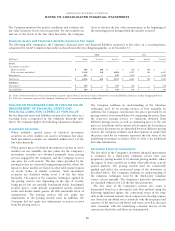American Express 2012 Annual Report Download - page 76
Download and view the complete annual report
Please find page 76 of the 2012 American Express annual report below. You can navigate through the pages in the report by either clicking on the pages listed below, or by using the keyword search tool below to find specific information within the annual report.
AMERICAN EXPRESS COMPANY
NOTES TO CONSOLIDATED FINANCIAL STATEMENTS
CREDIT QUALITY INDICATORS FOR CARDMEMBER LOANS AND RECEIVABLES
The following tables present the key credit quality indicators as of or for the years ended December 31:
2012 2011
Net Write-Off Rate Net Write-Off Rate
Principal
Only(a)
Principal,
Interest, &
Fees(a)
30 Days
Past Due
as a % of
Total
Principal
Only(a)
Principal,
Interest, &
Fees(a)
30 Days
Past Due
as a % of
Total
Cardmember Loans:
U.S. Card Services 2.1% 2.3% 1.2% 2.9% 3.2% 1.4%
International Card Services 1.9% 2.4% 1.5% 2.7% 3.3% 1.7%
Cardmember Receivables:
U.S. Card Services 1.9% 2.1% 1.8% 1.7% 1.9% 1.9%
2012 2011
Net Loss
Ratio as
a%of
Charge
Volume
90 Days
Past Billing
as a % of
Receivables
Net Loss
Ratio as
a%of
Charge
Volume
90 Days
Past Billing
as a % of
Receivables
Cardmember Receivables:
International Card Services 0.16% 0.9% 0.15% 0.9%
Global Commercial Services 0.06% 0.8% 0.06% 0.8%
(a) The Company presents a net write-off rate based on principal losses only (i.e., excluding interest and/or fees) to be consistent with industry convention. In addition,
because the Company’s practice is to include uncollectible interest and/or fees as part of its total provision for losses, a net write-off rate including principal, interest
and/or fees is also presented.
Refer to Note 5 for additional indicators, including external environmental factors, management considers in its monthly evaluation
process for reserves for losses.
IMPAIRED CARDMEMBER LOANS AND RECEIVABLES
Impaired loans and receivables are defined by GAAP as
individual larger balance or homogeneous pools of smaller
balance restructured loans and receivables for which it is
probable that the Company will be unable to collect all amounts
due according to the original contractual terms of the loan and
receivable agreement. The Company considers impaired loans
and receivables to include: (i) loans over 90 days past due still
accruing interest, (ii) non-accrual loans and (iii) loans and
receivables modified as troubled debt restructurings (TDRs).
The Company may modify, through various company
sponsored programs, cardmember loans and receivables in
instances where the cardmember is experiencing financial
difficulty to minimize losses while providing cardmembers with
temporary or permanent financial relief. The Company has
classified cardmember loans and receivables in these
modification programs as TDRs. Such modifications to the loans
and receivables may include (i) reducing the interest rate (as low
as zero percent, in which case the loan is characterized as non-
accrual in the Company’s TDR disclosures), (ii) reducing the
outstanding balance (in the event of a settlement),
(iii) suspending delinquency fees until the cardmember exits the
modification program and (iv) placing the cardmember on a
fixed payment plan not to exceed 60 months. Upon entering the
modification program, the cardmember’s ability to make future
purchases is either cancelled, or in certain cases suspended until
the cardmember successfully exits the modification program. In
accordance with the modification agreement with the
cardmember, loans revert back to the original contractual terms
(including the contractual interest rate) when the cardmember
exits the modification program, either (i) when all payments
have been made in accordance with the modification agreement
or (ii) the cardmember defaults out of the modification program.
In either case, the Company establishes a reserve for cardmember
interest charges considered to be uncollectible.
The performance of a loan or a receivable modified as a TDR is
closely monitored to understand its impact on the Company’s
reserve for losses. Though the ultimate success of modification
programs remains uncertain, the Company believes the
programs improve the cumulative loss performance of such
loans and receivables.
Reserves for cardmember loans and receivables modified as
TDRs are determined by the difference between the cash flows
expected to be received from the cardmember (taking into
consideration the probability of subsequent defaults), discounted
at the original effective interest rates, and the carrying value of
the cardmember loan or receivable balance. The Company
determines the original effective interest rate as the interest rate
in effect prior to the imposition of any penalty interest rate. All
changes in the impairment measurement, including the
component due to the passage of time, are included in the
provision for losses in the Consolidated Statements of Income.
74
























